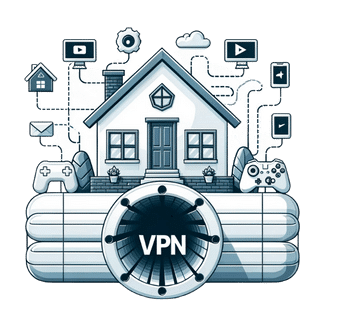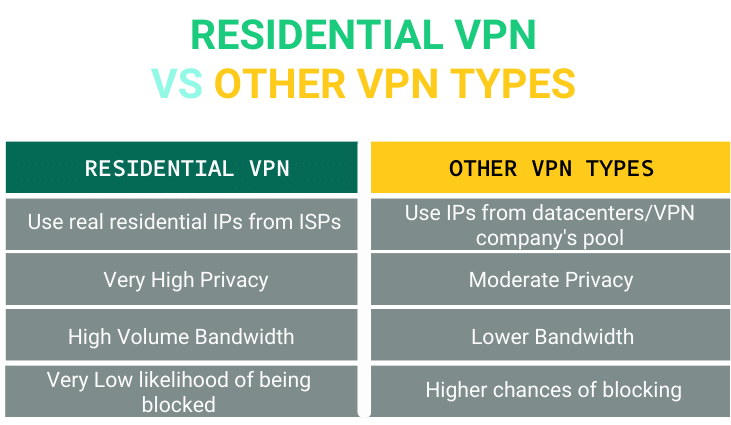VPN Service
- 40 Gbps Network Speeds
Our VPN network is built for speed, powered by next-generation technology. You don’t need to sacrifice speed for better security. Our virtual private network gives both.
- Supported Protocols
We support most Tunneling protocols such: PPP, L2TP, IPSec, and OpenVPN!
- Residential IPs
Stay 100% anonymous and use only real IP addresses provided by real ISPs and take advantage of the cleanest IP pools on the market. Zero bans, penalties, or captchas.
- Best-in-class encryption
Your data is protected by advanced mathematics in AES-256, the standard trusted by security experts worldwide.
- Private DNS
Our VPN Service runs its own private, encrypted DNS on every server, making your connections both safer and faster.
- Game better
Get an edge with a VPN for cloud gaming and game consoles by lowering ping and overall lag.
VPN Service Plans
- PPP, L2P/IPSec, Openvpn
- IP Version: IPv4
- IP Type: Residential
- Dedicated IP
- 0 Fraud / Elite Anonymous
- Speed: 10Gbps
- Country Location: USA
- City: VA
- Unlimited Bandwidth
- Delivery Time: 2 Hours.
- PPP, L2P/IPSec, Openvpn
- IP Version: IPv4
- IP Type: Residential
- Dedicated IP
- 0 Fraud / Elite Anonymous
- Speed: 40Gbps
- Country Location: USA
- City: VA
- Unlimited Bandwidth
- Delivery Time: 2 Hours.
- PPP, L2P/IPSec, Openvpn
- IP Version: IPv6
- IP Type: Residential
- Dedicated IP
- 0 Fraud / Elite Anonymous
- Speed: 10Gbps
- Country Location: USA
- City: VA
- Unlimited Bandwidth
- Delivery Time: 2 Hours.
- PPP, L2P/IPSec, Openvpn
- IP Version: IPv6
- IP Type: Residential
- Dedicated IP
- 0 Fraud / Elite Anonymous
- Speed: 40Gbps
- Country Location: USA
- City: VA
- Unlimited Bandwidth
- Delivery Time: 2 Hours.
Our Features
Residential/Data Center
Stay 100% anonymous and use only real IP addresses provided by real Internet service providers and take advantage of the cleanest proxy pools on the market. Zero bans, penalties, or captchas.
Unlimited Bandwidth
To deliver maximum efficiency to our customers, we have based our servers on 10/40Gbps speed networks that do not employ throttling or bandwidth limits.
HTTPs/SOCKS5 Support
We Support HTTPs/SOCKS5 Protocols over IPv4 and IPv6 plans to provide the best benefits for your business.
Static Proxies Plans
Direct ISP connectivity provides 24/7 IP availability. Keep your web sessions for as long as you need with Static Residential IPs.
Expert Support Team
With our friendly support Team working 24/7, get instant access to your purchased packs with the live support provided by our engineers!
Highly Anonymous
Stay 100% anonymous and use only real IP addresses provided by real Internet service providers and take advantage of the cleanest proxy pools on the market. Zero bans, penalties, or captchas.
Dual Authentication
We offer our clients the choice whether to have user/pass authentication or IP address authentication to provide the most benefit for their business!
Optional Monthly Rotation
We offer our clients the ability to replace their IPs and access a new IP pool after each monthly bill cycle!
Rotated Proxies Plans
Our rotated plans rotates proxies per each browser session by default to give you the most benefits of rotated proxies!
Proxies for all your needs
Our dedicated proxies are ideal for Social Networks, Rank Tracking, Game sites, Captcha Solving, Online Shopping, Sneaker copping, and many other purposes...
We Provide Custom Packs

Join Our Newsletter
Signup to receive email updates on new services, Special promotions, tech tips and more.
Have you ever thought about your online privacy or the intensity of internet surveillance in your everyday browsing? Sounds scary, right? This is where Virtual Private Networks (VPNs) come in handy. Among the various options, a residential VPN provides top-notch security and evasion from aggressive online data tracking.
The purpose of this guide is to provide fundamental insights about residential VPNs, focusing specifically on the services offered by V6proxies. We’ll demystify complex terminologies and answer commonly asked questions such as ‘What’s the difference between a Residential VPN and a typical VPN?’ and other info you need before buying.

What is a Residential VPN?
Ever stumbled upon a website and found the dreaded message ‘Sorry, this content is not available in your region’? It’s frustrating, right? This is where a Residential VPN comes in handy.
Simply put, a Residential VPN, much like your home address, provides you with an internet identity specific to your geographical region. It assigns you a new IP address from a real home that gets its connection from a real Internet Service Provider (ISP). The new IP address reflects a different geographical location, opening up a world of content that may have been region-restricted otherwise.
Fact: Every device connected to the internet has an IP (Internet Protocol) address. This address has information about your location. Some websites and services restrict access based on these IP addresses.
The Difference Between Residential VPNs and Other VPN Services
The key difference between residential VPN services and other kinds of VPN services lies fundamentally in the route your data takes and the level of security it receives as it moves between your device and the sites you visit. Let’s break this down a little further:
- Residential VPNs: When you use a service like v6proxies, your data is routed through residential IP addresses. These are the kinds of addresses commonly assigned by Internet Service Providers to homeowners.
This makes your browsing activity look regular and less suspicious to any prying eyes. One upshot? The odds of a website blocking or restricting your IP become significantly lower!
- Other VPNs: These services route your data through other types of IPs like those who come from datacenters. They’re speedy and can pack powerful security features, but they tend to get blocked more frequently than residential IPs. This is because they’re often associated with considerable amounts of web traffic, raising suspicions about bot activity.
So, the question isn’t ‘Residential vpn or other types?’ It’s ‘Which is the right VPN service for my needs?’ Do you need a secure, everyday browsing experience that lets you maintain the usual pace of your digital life? Then a residential VPN from v6proxies would be the ideal choice.
Why Buy a Dedicated (Private) Residential VPN over A Shared One?
Ever wondered why some people opt for a dedicated residential VPN instead of a shared one? Well, let’s dive into the reasons.
- Dedicated Bandwidth: With a dedicated VPN, you’re not sharing bandwidth with anyone else. This means you can enjoy a faster and smoother internet experience, no buffering, no slow downloads.
- Higher Security: Since you’re the sole user of your dedicated residential VPN, you have a lower risk of encountering malicious activities from other users which can be a concern on shared VPNs.
- Consistent IP: With a dedicated residential VPN, your IP remains constant. This is especially beneficial if you’re running certain tasks which require a consistent IP address. For example, if you’re working from home, a consistent IP will ensure your VPN doesn’t interfere with network access to your work resources.
And here’s the great news – at v6proxies.com, we provide premium dedicated (private) residential VPN services. No sharing, no limitations – it’s all about giving you the peace of mind you deserve.

What Does OpenVPN Mean?
OpenVPN is a popular software that implements VPN techniques to secure point-to-point and site-to-site connections. It aims to safeguard your private network traffic over the internet. So, why is this important when talking about residential VPNs?
Well, when you connect to a VPN, OpenVPN essentially creates a secure tunnel for your online activity. Your data travels within this “secure tunnel”, invisible to anyone else on the internet. Intriguing, isn’t it? In the world of VPNs, OpenVPN is often considered the gold standard. It’s known for its robust security, reliability, and open-source nature, making it a favorite among VPN users and providers, including v6proxies.
OpenVPN Main Advantages
One major benefit of OpenVPN is that it’s incredibly adaptable. It works on a variety of network configurations, such as NAT, and with just about any firewall. Comprehensive, right?
Another reason to love OpenVPN is that it supports a variety of encryption algorithms, including the military-grade AES-256 encryption. That’s some serious privacy protection for you!
When you opt for a VPN service from v6proxies, you’ll get the power of OpenVPN protecting your online activities. What this means for you is a low-risk, secure internet experience without sacrificing speed or usability.

Residential VPN Use Cases: Practical Examples
Now that we’ve shed some light on what residential VPNs are, let’s dive into some practical examples where they could be of huge benefit to you.
Access region-restricted content
A residential VPN allows you to access streaming content or websites that may be blocked or restricted in your country. For example, connecting to a USA-based VPN server lets you access US Netflix and Hulu.
Get Enhanced privacy and anonymity
Using a VPN hides your real IP address and encrypts your internet traffic. This prevents your ISP and others from tracking your online activities and collecting data on your browsing habits.
Secure public WiFi connections
Connecting to public WiFi hotspots without a VPN exposes you to risks like data theft or snooping. A VPN secures your connection on public networks.
Bypass internet censorship
In some countries, governments censor or block access to certain websites and services. A residential VPN helps circumvent this censorship so you can access everything on the internet freely.
Online gaming
A residential VPN provides a secure and stable connection for online gaming by masking your IP address and avoiding network congestion. This is especially useful if you want to access gaming servers restricted to certain regions.
FAQs and Answers
What is VPN split-tunneling?
With split tunneling, you can route some device traffic through the VPN while allowing other traffic to bypass the VPN. This allows you to securely access region-restricted sites and maintain local network access.
What is the recommended internet speed for vpn?
Internet speed for a VPN is a crucial aspect you should consider before purchasing any VPN service, including a residential VPN. But what is the recommended speed? The answer is, it depends.
It depends on your online activities. For simple browsing and emailing, a speed of 1-5 Mbps is usually sufficient. However, if you’re into streaming high-definition video or online gaming, you might need a speed of 15-25 Mbps or even more.
But here’s the good news: with v6proxies.com, you’re not going to worry about speed. We provide high-speed connections that will suit whatever your online needs may be. Whether it’s streaming, gaming, or just casual browsing, you can trust our residential VPN to deliver the speed required.
What are the IP versions of the VPN V6proxies provide?
We offer both IPV4 and IPV6 residential VPN IPs located in the US. You can choose whatever suits your needs from our plans.
Related:

